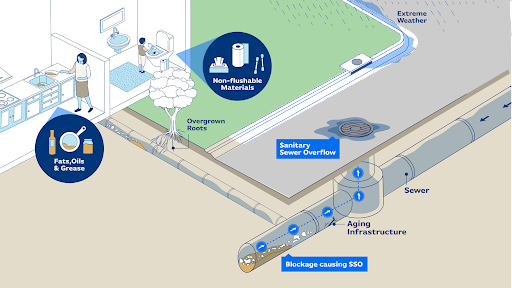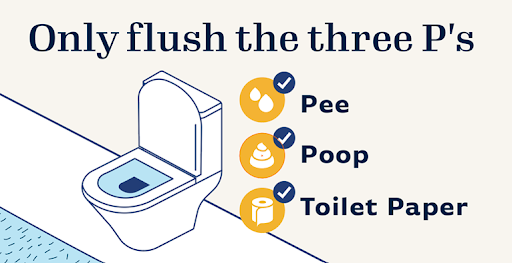Sanity Sewer Overflow Map Viewer
Sanitary sewer overflows are caused by sewer system obstructions, damage, or flows in excess of sewer capacity (rather than treatment plant capacity.) With nearly 1,800 miles of sewer lines throughout its service area, DPW appreciates notification from the public if a sewer backup is suspected. Please call the 24-hour Emergency Services line at (410) 222-8400 at any time to report water or sewer emergencies in Anne Arundel County.
A sanitary sewer overflow (SSO) is an overflow (or spill) of untreated wastewater from a sanitary sewer system. When an SSO happens, DPW takes it seriously with quick and targeted responses. These actions help limit the impact on the environment.
- Sewer overflows are not 100% preventable. Together we can minimize their chances and their impacts.
- Natural causes, accidents, aging infrastructure, or individual behavior can impact the sewer system’s performance.
- SSOs can cause short-term harm to the environment or public health, so DPW has crews available to respond to an SSO 24/7.

What DPW is Doing
- We invest over $25 million every year – our largest ongoing system investment – in replacing and upgrading wastewater infrastructure, including gravity sewer, force mains and pumping stations. These investments are paying off in reduced overflows.
- DPW prioritizes the maintenance, repair, and upgrade of our sewer system.
- We’ve implemented County-wide standards to plan for and respond to service disruption, including having generators and standby equipment on-site to provide redundancy in the event of equipment failure.
What Residents Can Do
- Conserve water. Less water used means less water in the sewer system.
- Never flush baby wipes, hygiene products, or foreign objects down toilets, even if they claim to be “flushable.”
- Never pour fats, oils, or grease down kitchen or bathroom sinks.
- Properly maintain and inspect home sewer connections. Immediately report (24 hours a day, 7 days a week) an overflow or breakage in the sanitary sewer system to 410-222-8400.

Sanitary Sewer Overflows FAQs
A sanitary sewer overflow (SSO) is an overflow or spill of untreated wastewater from a sanitary sewer system.
SSOs can be caused by anything that prevents the normal flow of wastewater. This includes natural causes, such as extreme weather or overgrown tree roots, accidents, like flushing non-flushable materials or a contractor damaging a pipe, or aging infrastructure, like pipe corrosion.
In Anne Arundel County, large SSOs are infrequent, and the overall impact is often minimal. Over the last five years there has been an average of 45 spills that occur each year, and most are less than 400 gallons. DPW’s rapid response ensures that more than two-thirds of these spills are cleaned up before reaching a local waterway.
DPW also created a public facing SSO map that provides information and locations for all spills that occur in the County.
An SSO may release pollutants onto the ground or, in rare instances, into our waterways like the Chesapeake Bay. This can cause short-term harm to the environment or public health, so DPW takes each SSO seriously, sending crews to respond to any spill, night or day.
Yes. DPW classifies an SSO event as a large, medium, small, or minor depending on how many gallons are spilled. DPW releases information directly to media about large SSO events, which is any SSO that exceeds 10,000 gallons. All SSOs, regardless of size, are reported and publicly available on the SSO dashboard, which is available here: SSO Map
If you observe foul-smelling water overflowing from a manhole or exposed pipe in a stream bank, it may be an SSO. Call 410-222-8400 immediately for assistance.
DPW maintains 24/7 emergency response teams to investigate and repair damage from SSOs. Based on the severity of the spill, DPW and the Department of Health (DOH) will follow strict public notification policies, which may include posting signage in affected areas, sending media alerts, updating agency websites and the water quality phone line, and directly notifying community groups, schools, hospitals, homeowners, and businesses who could be directly impacted.
Say something! Report an overflow or breakage in the sanitary sewer system (24 hours a day, 7 days a week) to 410-222-8400.
No! Do not flush baby wipes, personal hygiene products, or foreign objects down the toilet, even if they claim to be “flushable.”
No, never pour fats, oils, or grease down the kitchen or bathroom sinks, even when these items are liquid and when you are using a garbage disposal. These substances can cause buildup in pipes and can lead to a blockage that causes an SSO.
DPW invests over $25 million every year, the largest ongoing system investment, towards replacing and upgrading wastewater infrastructure, pumping stations, and the Cattail Creek Sewer Force Main Replacement.
DPW maintains crews 24/7 for emergency repairs.
DPW is implementing county-wide standards to plan for and react to service disruptions, including having generators and standby equipment on-site in the event of equipment failure.
- Conserve water. Less water used means less water in the sewer system.
- Never flush baby wipes, hygiene products, or foreign objects down toilets, even if they claim to be “flushable.”
- Never pour fats, oils, or grease down kitchen or bathroom sinks.
- Properly maintain and inspect home sewer connections.
- Immediately report (24 hours a day, 7 days a week) an overflow or breakage in the sanitary sewer system to 410-222-8400.
